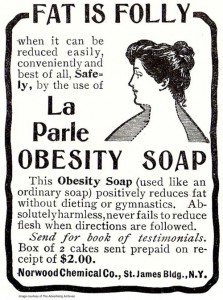Short Cuts: Gratuitous edition.
By Lesley | February 22, 2011
First up, we have an article from the venerable New York Times on the use of primates for obesity research. They’re also being used for research into diabetes, diet drugs, and weight-loss surgery. What makes this interesting, however, is that the obesity is induced by overfeeding said monkeys high-calorie foods, and by keeping them confined in individual cages for months or even years so they cannot exercise (or socialize, for that matter). This actually seems to me to be less a matter of studying obesity than it is studying what happens when you confine an animal and overfeed it, which is not the general experience of most fat people. Are some people fat because of overeating and a lack of free movement? Sure. Are the majority? I do not think so; I know too many fats who defy this assumption. But of course, they could be liars:
…[U]nlike human subjects who are notorious for fudging their daily calorie or carbohydrate counts, a caged monkey’s food intake is much easier for researchers to count and control. “Nonhuman primates don’t lie to you,†said Dr. Grove, who is a neuroscientist. “We know exactly how much they are eating.â€
Of course, the fact that said researchers don’t know exactly how much human participants are eating would seem to indicate that perhaps the presumed connection between caloric intake and fattery is not so obvious, but what the fuck do I know? I’m not a neuroscientist.
Said monkeys are also being starved, given experimental diet drugs, and weight-loss surgery, all in the name of learning about obesity. I am not generally one who is sensitive on the subject of animal testing, but this article got under my skin a little. I’m upset by the implication that fat people sit around eating alone in closed rooms, but this work also seems a bit gratuitous to me. And I’m not alone:
Some companies see no need to use primates to study obesity and diabetes, saying it is almost as easy to do human studies. Monkey studies can cost up to several million dollars. The animals are so precious that only a small number can be used. And there are ethical reviews before a study can begin.
But hey, the monkeys aren’t big fat liars! So there’s that.
EDIT: Smartypants commenter Medea articulates a super critical point of one of the referenced studies that I completely missed:
One feature of the monkey story that got completely buried is about halfway down the text: “Still, about 40 percent do not put on a lot of weight.â€
They’re feeding all the monkeys the same diet, but only 3 in 5 get fat. That’s a huge finding. And it casts some doubt on the researchers’ assertion that existing disconnects between fatness and diet can be explained by human subjects’ dishonesty. The NYT author seems to try to hide it by sandwiching it between statements about the role of carbohydrates–which has nothing do do with the fact that monkeys eating identical diets have different body composition outcomes.
Thanks Medea! I love when commenters make the important observations I overlook.
—
Next we have an MSNBC article about a study on weight-loss surgery, telling us something we already knew. Um, hooray! That’s funding well spent. The study says that gastric bypass surgery — that’s the cutting-up-your-insides version — produces more weight loss than lapband surgery — that’s the inflatable-silicone-donut-around-your-stomach version. This was already well established, in fact, but apparently MSNBC was hard up for an obesity article for Monday evening.
What’s odd is that this same study was framed on my local morning news as proving that gastric bypass surgery is safer than lapband surgery. Not only does MSNBC ignore this angle altogether — and if true, that would be new information, as gastric bypass has always been associated with a greater risk of complications — but it seems to be inaccurate. The MSNBC article only mentions that the study found both gastric bypass and lapband surgeries have similar risks of complications. Does this mean gastric bypass has become safer, or that the lapband is less safe than we thought? It might be in the study, but it ain’t in the MSNBC article! Of course, it’s not like we read these articles except to be reassured that everything we think we know is mostly true. Obesity obesity obesity epidemic death diabetes lapband roux-en-y blah blah blah blah blah immortality stubbornly eludes us still.
—
As a response to recent feminist conversations about gaming and games culture, some brilliant and magnificent soul has created “Fat, Ugly or Slutty,” a Tumblr collecting instances of harassment on various social gaming platforms. Xbox Live is, unsurprisingly, a chronic offender, but all the submissions are replete with LOLSOB potential. Laugh, or get angry, I could go either way myself.
—
My newest imaginary TV girlfriend, Ashley Fink, has done a charming interview with ET’s Mary Hart. You can watch some clips below.
—
Got any links of interest I missed? Drop ’em in comments.




 Two Whole Cakes is a blog written by
Two Whole Cakes is a blog written by 


25 Comments